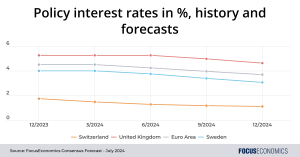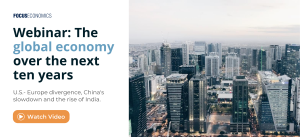Macroeconomic boost
Taylor Swift’s Eras tour is massive in scope, encompassing over 150 shows and millions of spectators on five continents over a period of nearly two years. Demand for the tour has been so high that it has caused ticket websites to crash and left millions of people in virtual queues trying to secure seats. And once completed, the Eras tour is set to be the highest grossing in history, surpassing that of the Rolling Stones in the late 2010s. The broader macroeconomic boost is equally impressive: In the tour’s U.S. leg, it generated consumer spending worth USD 5 billion, and Barclays analysts see over USD 1 billion spending in the UK when the popstar visits the country this summer, as concert-goers splurge on travel, accommodation, outfits, and other expenses in addition to tickets. Barclays puts average spend per person at over USD 1000, more than ten times the cost of the average British night out.
Upward pressure on inflation
The Tour is also putting upward pressure on prices for hotels, flights and restaurants in the cities where she performs, muddying the inflation picture for central banks as they weigh up potential rate cuts. In May for instance, Portugal’s statistical office reported that prices rose from April due to a “major cultural event” in Lisbon—Swift performed in the city on 24-25 May. Also in May, Sweden’s core inflation increased unexpectedly, likely in part due to the impact of three Swift concerts in the capital. And economists at TD Economics cautioned that the pop artist’s UK tour dates in August could encourage the Bank of England (BOE) to refrain from rate cuts in September.
Inflation downtrend won’t be interrupted for long
Thankfully for Europe’s monetary authorities, upticks in inflation as the Taylor Swift bandwagon rolls through town are likely to prove no more than temporary blips. Our Consensus Forecasts are still for consumer price pressures to trend down later this year, allowing space for the continent’s central banks to pare back interest rates—something which will provide Europe’s businesses and consumers with a more lasting reason to smile, once the economic sugar rush of Swift’s concerts has worn off.
Insight from our analyst network
Nomura analysts commented on the economic impact:
“We expect the impact of superstar concerts to be localized to specific sectors of the economy, particularly the hospitality, F&B and public transportation sectors. The potential for these localized effects materializing in macro-level national statistics is less in larger economies such as the US, UK and Japan, moderate in Australia and higher in the small city-state of Singapore. But even in Singapore, where there were also Coldplay concerts in Q1, the impact will likely be moderate, and felt more on growth (perhaps contributing ~0.25pp to Q1 real GDP growth).”
Our latest analysis
U.S. retail sales were muted in May.
Chile’s central bank cut rates in June.


